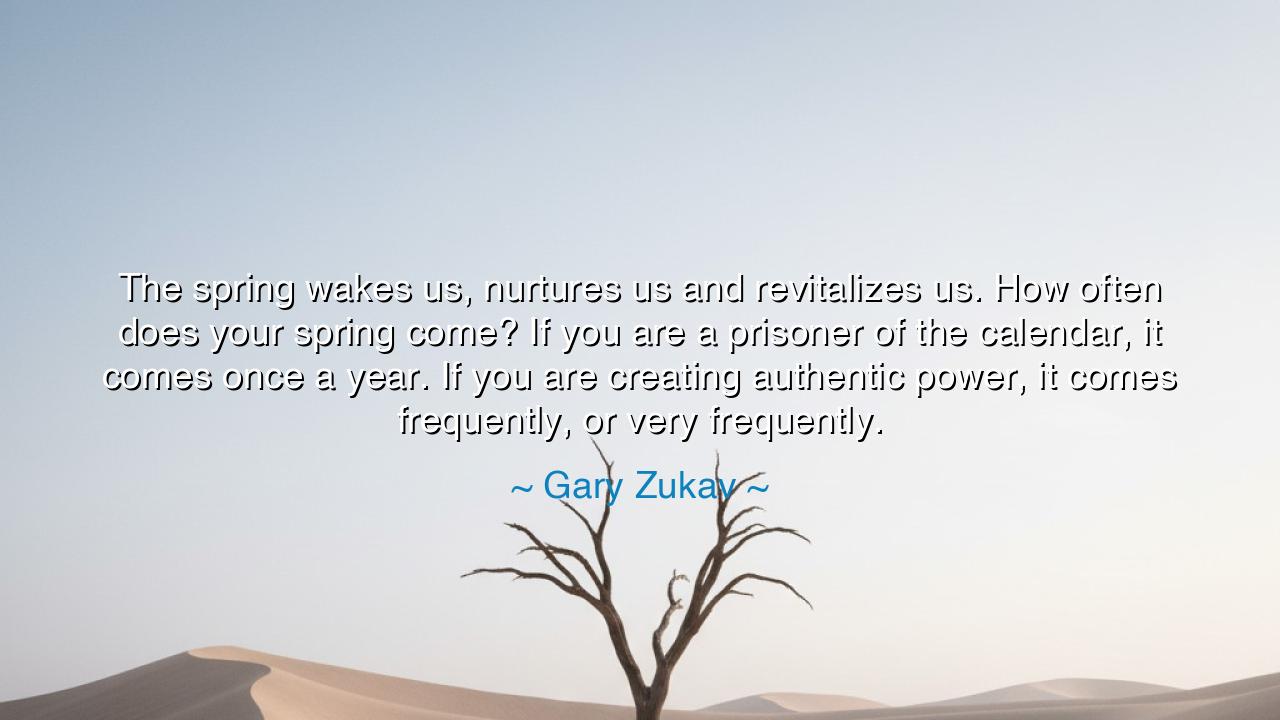
The spring wakes us, nurtures us and revitalizes us. How often
The spring wakes us, nurtures us and revitalizes us. How often does your spring come? If you are a prisoner of the calendar, it comes once a year. If you are creating authentic power, it comes frequently, or very frequently.






Hearken, O seekers of vitality, to the words of Gary Zukav, who speaks of the eternal rejuvenation that lies within and around us. He tells us that the spring awakens the soul, nurtures the spirit, and revitalizes the being. This awakening is not merely the turning of seasons, but a reflection of the inner cycles of growth and renewal. Herein lies a teaching for the ages: the power to renew oneself is both natural and sacred, and its frequency depends upon the depth of our engagement with life.
The origin of this reflection emerges from Zukav’s life as a philosopher and spiritual teacher, one who explores the nature of human consciousness and authentic power. He observes that many mortals remain bound to the calendar, experiencing renewal only in accordance with external rhythms—once a year, with the coming of spring. Yet those who cultivate authentic power, who nurture the inner life, awaken spring within themselves frequently, drawing on the limitless potential of the spirit rather than the dictates of time.
The meaning of this aphorism is profound: true power arises not from external markers, but from the cultivation of inner awareness, discipline, and creativity. When one becomes a steward of the soul, renewal is not a rare gift, but a frequent companion. The awakening that others experience seasonally may become a constant flow of energy, insight, and inspiration, a perpetual spring that refreshes and sustains the heart.
History provides testimony to this teaching. Consider Leonardo da Vinci, whose mind and spirit remained in perennial spring, ever curious, ever creative. Though centuries passed, his sketches, studies, and inventions reveal a man who continually nurtured himself, who drew inspiration from nature, art, and observation, and whose inner vitality never rested. Here is the example of authentic power: renewal born not from external time, but from ceaseless engagement with the world and the self.
Moreover, this teaching extends to all who seek growth. The artist who paints daily, the thinker who reflects with rigor, the healer who renews her compassion with each patient—each taps into the spring within, experiencing frequent revitalization. Zukav reminds us that the cycles of the soul are not dictated solely by calendars or seasons, but by the conscious cultivation of presence, awareness, and inner power.
O generations yet unborn, take this counsel into your hearts: awaken your spring, nurture it with care, and allow it to revitalize your being frequently. Do not wait for the turning of the seasons alone; create authentic power, and let renewal flow as often as your spirit demands. In this, the soul learns to live fully, to grow perpetually, and to thrive in the eternal spring of conscious engagement and vitality.






NQNguyen Nhu Quynh
This quote sparks questions about time and perception. If most people experience renewal only annually, what prevents more frequent access—habit, mindset, or societal pressures? I’m also interested in the balance between external circumstances and inner states: can authentic power truly generate continuous revitalization independent of the environment, or does it require supportive conditions? Finally, it raises practical considerations: what daily practices or habits might help someone cultivate these frequent experiences of energy and growth?
TNThu Thuy Ngo
Reading this, I’m curious about the relationship between personal empowerment and vitality. Does frequent renewal require inner reflection, discipline, or a conscious approach to life’s opportunities? How do external environments—like nature, relationships, and work—affect our ability to experience this sense of revitalization? It also prompts reflection on whether these moments of 'spring' are primarily emotional, mental, or spiritual, and how integrating them consistently could influence overall well-being and creativity.
SDSa Dethw
I find this perspective intriguing but also challenging. How realistic is it for people to create their own frequent renewal in the midst of daily responsibilities, stress, and obligations? Can authentic power be cultivated systematically, or is it dependent on spontaneous insight and inner alignment? Additionally, does Zukav imply that people who rely on external cycles are missing an inner resource, and how might one develop the ability to access this spring regularly?
L8Hong Thien An lop 8/10
This quote makes me think about how we experience renewal in life. Is Zukav suggesting that true personal growth allows us to feel revitalized beyond the cycles of the seasons, or is this more metaphorical? I wonder how one cultivates the ability to access this frequent 'spring'—is it through mindfulness, creativity, or intentional living? It also raises questions about how routine and obligation might limit our capacity for these moments of energy and inspiration.